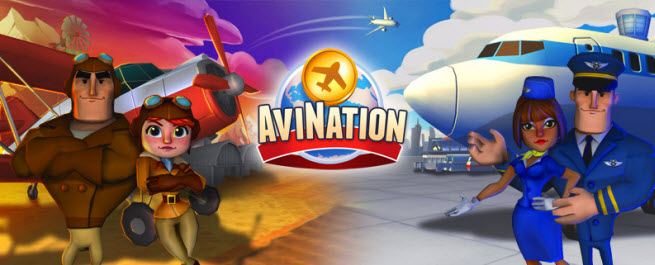Many game developers have moaned about the lack of quality and real gameplay in Facebook games. Checkpoint Studios was founded to do something about that, and the company is launching a high-end flight history simulation game today dubbed AviNation.
Inspired by Japanese titles where you can play as an airline manager or air traffic controller, AviNation lets players build an aviation empire through key decades of flight history from the 1930s onward. The game has rich 3D graphics and runs on the Unity 3D engine, giving it a leg up on other Facebook titles in graphics quality. And it’s the kind of game that hardcore player Brian Wiklem, co-founder and chief executive of Checkpoint, always wanted to play. AviNation will launch in June.
Your goal is to become a modern-day airline mogul. You manage your flight crew, run daily operations at the airport, and control air traffic by directing planes in and out of gates. You can open a network of friendly airports to increase your passenger traffic or ship freight. If you do your job right, the population of your town will grow, and you’ll earn achievements for completing quests.
“We’ve seen a lot of games that were flat and linear, ” Wiklem said in an interview with GamesBeat. “We were bored with point-and-click gameplay and virtual chores. They’re glorified activities, not games. You are led from one activity to the next, with no sense of discovery.”
Simulation games are still the biggest category on Facebook thanks to titles such as Zynga’s FarmVille and CityVille. But the airline genre is a fresher concept. It takes skill to run your airline and master the included minigames, Wiklem said.
The whole point is to move the industry forward from Social Games 1.0 to Social Games 2.0. That should increase engagement and lead to more loyal fans. The game is social because you can send flights to friends within your social network in real-world locations.
The 3D cartoon-style world has changing weather and day-to-night effects. The characters are cartoonish yet customizable and detailed. You can adjust the camera angle to zoom in close or get a bird’s-eye view.
The game has 250 aircraft, including authentic historic and modern aircraft that are licensed from Boeing and others. Other features coming include the ability to play any time, anywhere on smartphones and tablets. And Wiklem says the game has an innovative feature where spectators who watch messages from the game in a Facebook activity stream can click on the messages and actually help out. Such peer-to-peer interaction can happen even if your friends aren’t currently playing. Checkpoint has actually filed for patents on its cross-platform strategy.
The Costa Mesa, Calif.-based company was founded in 2011, and it has 30 employees. Rivals include Kixeye, Idol Games, 6waves, and Kabam. Larger rivals are Zynga, EA, and Disney-Playdom. Checkpoint’s investor is Marvelous AQL, a Tokyo, Japan-based publisher headed by Hayao Nakayama, former chief executive of Sega. Checkpoint has raised $5 million.
Wiklem said that he always remembered the answer that Pixar’s founders gave when they were asked why they made movies for children. They said they didn’t. Rather, they said they made movies that they wanted to see. By the same token, Wiklem said that social games don’t have to be crappy.
“I set out to change that,” he said.
Wiklem formerly worked at THQ’s Heavy Iron Studios and at Shiny Entertainment. He managed teams of 80 or more developers. He also spent eight years at Sony working on PlayStation and PlayStation 2 games. He’s a commercial aviation enthusiast and founder of Jet-X-Models, a maker of die-cast model airplanes. He is joined by Todd Morgan, executive producer and head of studio operations (formerly of Obsidian Entertainment, Super Villain Studios, and Shiny Entertainment); Chris Masterton, chief technology officer (formerly of Heavy Iron Studios); and Chris Naves, art director (formerly of Foundation 9 and Shiny Entertainment).
Game industry veterans David Perry and David Jaffe both liked Wiklem’s idea but told him he wouldn’t get funding unless he made a Facebook game. So Wiklem reworked what he had into an idea that could be executed on Facebook. He happened to know a friend who knew Nakayama. He made the pitch and after a 15-minute pitch that turned into two hours, he sold Nakayama on the idea.
Check out the art gallery below.
![]() GamesBeat 2012 is VentureBeat’s fourth annual conference on disruption in the video game market. This year we’re calling on speakers from the hottest mobile, social, PC, and console companies to debate new ways to stay on pace with changing consumer tastes and platforms. Join 500+ execs, investors, analysts, entrepreneurs, and press as we explore the gaming industry’s latest trends and newest monetization opportunities. The event takes place July 10-11 in San Francisco, and you can get your early-bird tickets here.
GamesBeat 2012 is VentureBeat’s fourth annual conference on disruption in the video game market. This year we’re calling on speakers from the hottest mobile, social, PC, and console companies to debate new ways to stay on pace with changing consumer tastes and platforms. Join 500+ execs, investors, analysts, entrepreneurs, and press as we explore the gaming industry’s latest trends and newest monetization opportunities. The event takes place July 10-11 in San Francisco, and you can get your early-bird tickets here.
[vb_gallery id=428674]
VentureBeat's mission is to be a digital town square for technical decision-makers to gain knowledge about transformative enterprise technology and transact. Learn More

